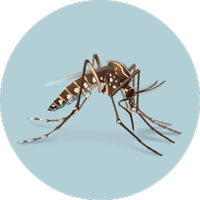We’ve had an unseasonably warm winter here in the Chicagoland area but colder days are surely ahead which will bring spring break planning to the front of many families’ minds. The emergence of Zika virus invariably has an impact on the travel plans of many of our practice’s families.
By this time, most parents know that Zika is a virus spread mostly via the bite of an infected mosquito, though it can also be spread through sexual contact. What makes Zika of particular public health concern is that many people who are infected with Zika do not show any symptoms. If the person infected is a pregnant woman, Zika has the ability to pass to an unborn fetus and cause numerous birth defects, most notably microcephaly, or small head (and therefore brain) size. As a result, the CDC has issued a warning that all pregnant women should avoid traveling to areas of the world with Zika virus and that families who are considering having children avoid trying to conceive until at least 6 months after having returned from a Zika-endemic area to allow adequate time from a Zika exposure, however unlikely, to have fully resolved in either parent.
It has always been helpful to consult your child’s pediatrician prior to any international travel to go over the need for any travel vaccines and ways to help keep you and your family safe and healthy. While there is no vaccine currently for Zika virus, 10-30% DEET-containing mosquito repellant is recommended by the American Academy of Pediatrics to reduce the likelihood of mosquito-borne illnesses for children and infants older than 2 months of age.
Although Zika virus infection is very uncommon in returning travelers, if you are concerned that one of your children became infected with Zika virus while traveling, consult with your pediatrician upon your return. It’s important to remember that there is no treatment for Zika virus and that the infection resolves after several days to a week on its own; among non-pregnant individuals, testing is performed so that appropriate public health measures may be taken. Symptoms of Zika virus are similar to most viral illnesses and can include a combination of fever, muscle/joint pain, headache, rash and eye redness lasting from several days to a week in duration.
The CDC maintains extremely thorough and comprehensive surveillance databases about Zika virus both in the United States and across the globe. The following weblink (https://www.cdc.gov/zika/geo/index.html) provides the most up-to-date information regarding areas with Zika virus as well as the links to several other CDC websites illustrating where travel advisories have been issued. At the time of this blog post, the only continental U.S. locations with locally-acquired cases – defined as cases NOT contracted while in another country and then diagnosed upon return to the U.S. – are South Florida and Brownsville, Texas. Your pediatrician is also available to help navigate any decision-making as it pertains to Zika virus and your own family’s travel plans.
It is important to be clear about the things that are known about Zika and those that we don’t know. Many parents (us included!) would love to know the longterm implications of infection with Zika virus when the infection happens in infancy or early childhood; this will be a topic of research moving forward but is not yet an area where we as a medical community have a clear answer.
While it’s important to pay attention to the CDC’s travel advisories, I’d say that it is equally important not to “go overboard” and cancel a perfectly safe trip out of a concern for Zika virus. There are still plenty of fun places worthy of a vacation this year for families who are considering having other children in the near future and even travel to areas of the world with Zika virus may be done safely by those whose families are complete in the overwhelming majority of cases provided that appropriate precautions are taken.
Hopefully after reading this, the most you will end up needing to worry about now with your spring break plans is which sunscreen to pack (we’d say AT LEAST an SPF 15!).
Reference & Image Credit: CDC website on Zika virus (https://www.cdc.gov/zika/)
Written by: Dr. Benjamin Kornfeld

